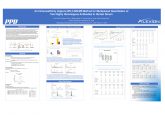Urinary assay developed as a screening test for acute pulmonary embolism
Date: 29 May, 2014
Assay of Fibrinopeptide B, a small peptide released when thrombosis form, could offer new screening test.
In a collaboration between researchers from the University of California (CA, USA) and University of Ottawa (ON, Canada), a novel screening test for acute pulmonary embolism has recently been presented. The assay tests for levels of Fibrinopeptide B (FPB) – a small peptide released when thrombosis form that is then excreted in the urine.
An assay of D-dimer, a peptide present in blood after clots begin to break down, is traditionally used to screen for acute pulmonary embolism. In comparison, the FPB test is carried out on urine samples, offering a less invasive option. In addition, since FPB is released when thrombosis form, this assay reflects ongoing clot activity, rather than clot degradation.
This recently presented research follows a pilot study, which suggested that FPB could be used to screen patients for venous thromboembolism. To further investigate this finding, the authors tested their FPB assay on stored samples from the multicenter, randomized Pulmonary Embolism Diagnosis Study (PEDS). This study included 1417 patients with high likelihood of acute pulmonary embolism. Out of these patients, samples from 344 patients were selected to form a study group.
The sensitivity and specificity of the assay was measured at three levels of urine FPB – 2.5, 5 and 7.5 ng/ml, using competition ELISA techniques. The results demonstrated comparable sensitivity to the traditional D-dimer test at concentrations of 2.5 ng/ml. In addition, greater specificity was demonstrated in the FPB test.
Looking to the future, the team envisage their assay being used alongside the current D-dimer test, and plan to develop a urine dipstick test. Additionally, the team will assess the applicability of their assay for screening for other conditions – to predict, for instance, the likelihood of recurrent venous thromboembolism after anticoagulation.
Source: Fernandes TM, De Santis D , Chiles PG, Marsh JJ, Wells PS, Morris TA. Urine fibrinopeptide B as a screening test for acute pulmonary embolism. A56. Pulmonary embolism: acute and chronic. San Diego, CA, USA, 16-21 May 2014 (A1840).






